外研版英语七年级上册 Module 6 A trip to the zoo Unit 1 Does it eat meat? 课件(共45张PPT,内嵌音频)
文档属性
| 名称 | 外研版英语七年级上册 Module 6 A trip to the zoo Unit 1 Does it eat meat? 课件(共45张PPT,内嵌音频) |
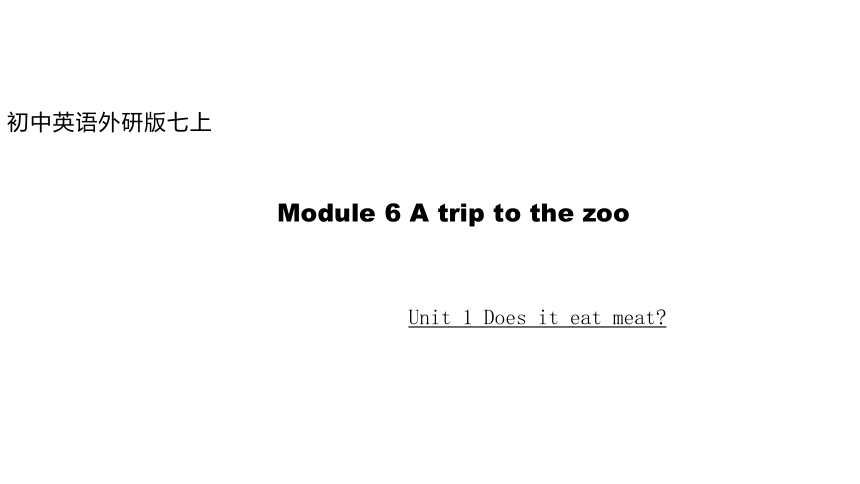
|
|
| 格式 | pptx | ||
| 文件大小 | 5.2MB | ||
| 资源类型 | 教案 | ||
| 版本资源 | 外研版 | ||
| 科目 | 英语 | ||
| 更新时间 | 2023-06-04 10:18:32 | ||
图片预览

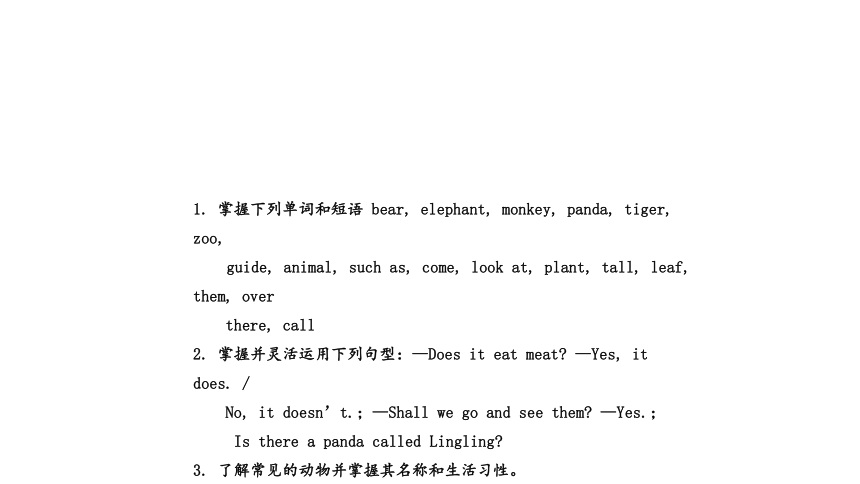
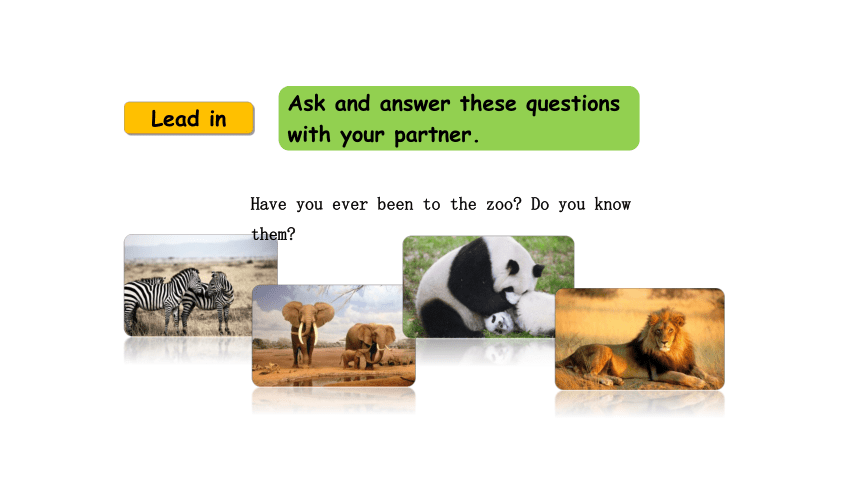
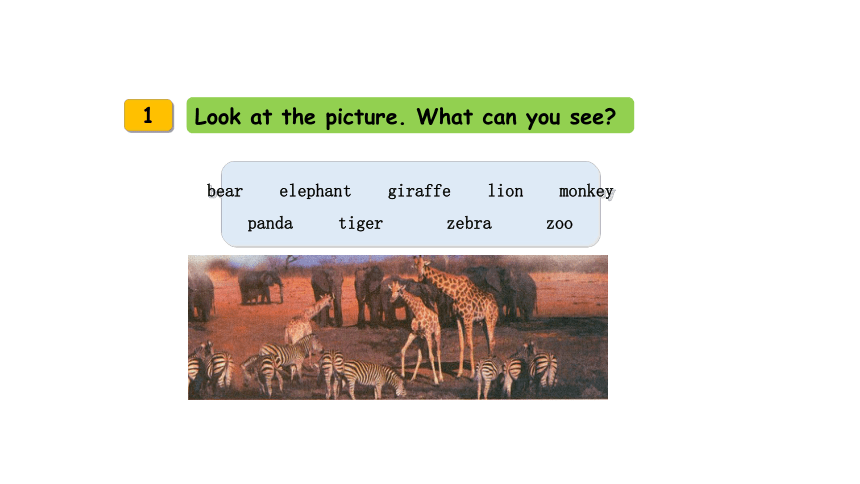
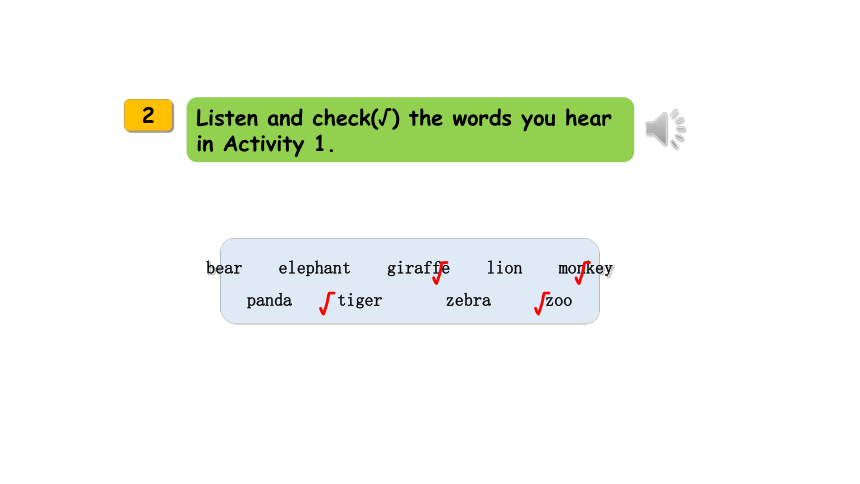
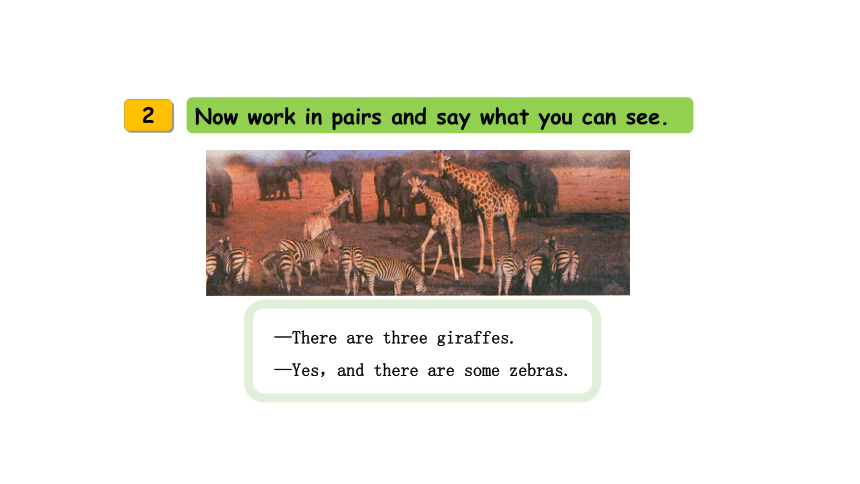


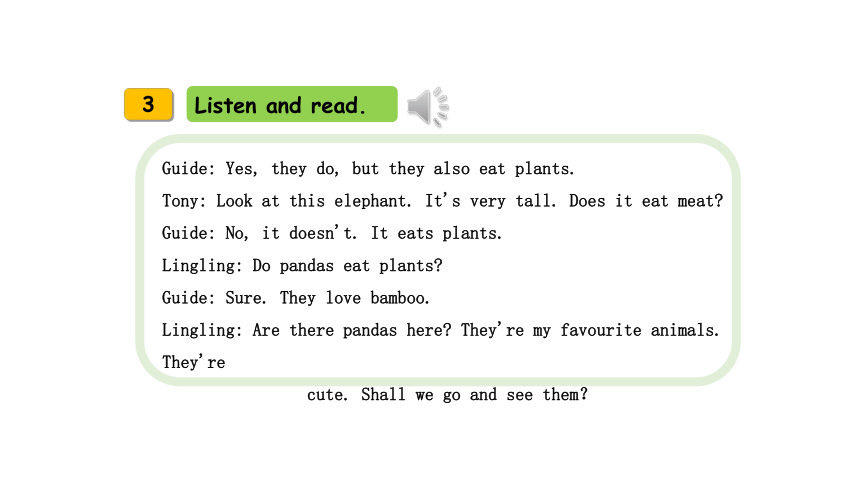
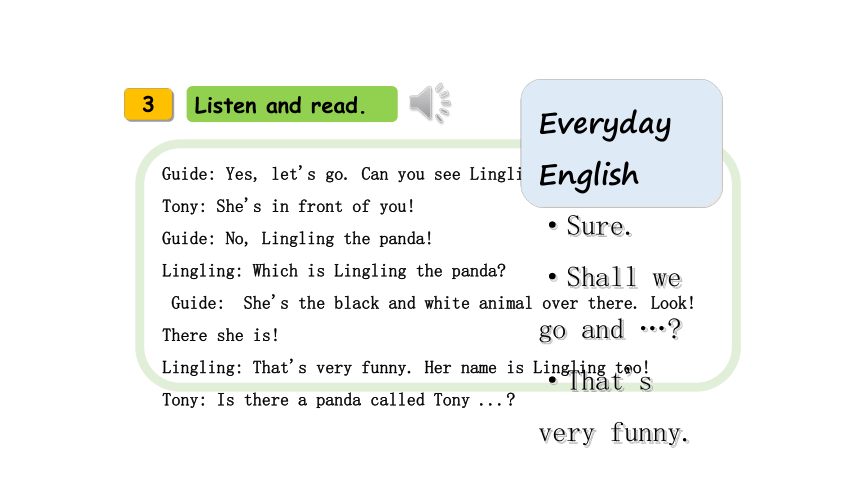
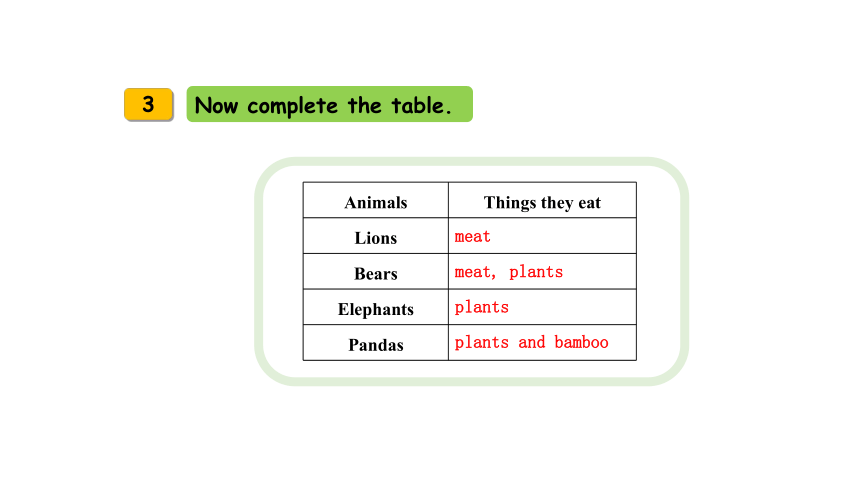
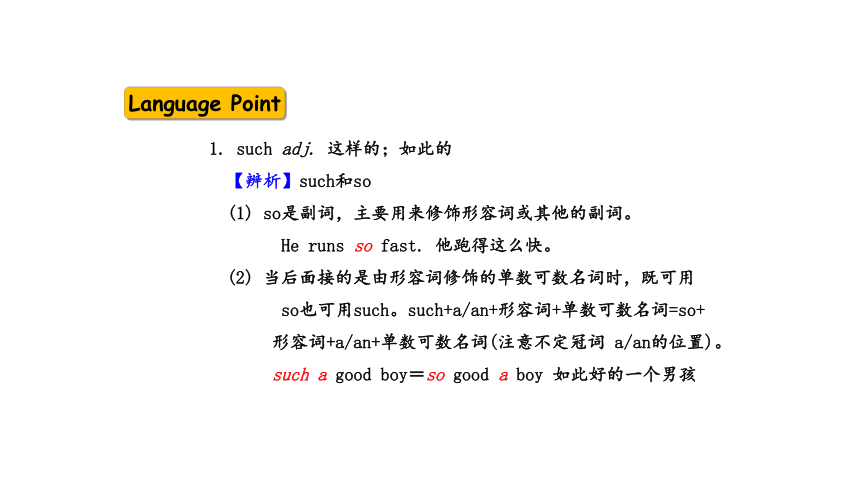
文档简介
(共45张PPT)
Module 6 A trip to the zoo
初中英语外研版七上
Unit 1 Does it eat meat
1. 掌握下列单词和短语 bear, elephant, monkey, panda, tiger, zoo,
guide, animal, such as, come, look at, plant, tall, leaf, them, over
there, call
2. 掌握并灵活运用下列句型:—Does it eat meat —Yes, it does. /
No, it doesn’t.;—Shall we go and see them —Yes.;
Is there a panda called Lingling
3. 了解常见的动物并掌握其名称和生活习性。
Lead in
Ask and answer these questions
with your partner.
Have you ever been to the zoo Do you know them
1
Look at the picture. What can you see
bear elephant giraffe lion monkey
panda tiger zebra zoo
2
Listen and check(√) the words you hear in Activity 1.
bear elephant giraffe lion monkey
panda tiger zebra zoo
√
√
√
√
2
Now work in pairs and say what you can see.
—There are three giraffes.
—Yes,and there are some zebras.
听力材料
Tony: Do you like pandas, Lingling
Lingling: I love pandas. They’re my favourite animals.
What about you Which animals do you like
Tony: My favourite animals are monkeys and giraffes.
Lingling: OK. Let’s go to the zoo and see them.
Tony: Sure. Let’s go!
3
Listen and read.
Guide: Welcome to Beijing Zoo. The zoo has many kinds of animals,
such as bears, zebras, giraffes and pandas. They come from
many different countries and they eat different food. Here are
the lions.
Tony: Do lions eat meat
Guide: Yes, they do. They eat other animals. They're dangerous!
Lingling: Ugh! And what about bears Do they eat meat
3
Listen and read.
Guide: Yes, they do, but they also eat plants.
Tony: Look at this elephant. It's very tall. Does it eat meat
Guide: No, it doesn't. It eats plants.
Lingling: Do pandas eat plants
Guide: Sure. They love bamboo.
Lingling: Are there pandas here They're my favourite animals. They're
cute. Shall we go and see them?
3
Listen and read.
Guide: Yes, let's go. Can you see Lingling
Tony: She's in front of you!
Guide: No, Lingling the panda!
Lingling: Which is Lingling the panda
Guide: She's the black and white animal over there. Look! There she is!
Lingling: That's very funny. Her name is Lingling too!
Tony: Is there a panda called Tony ...
Everyday English
·Sure.
·Shall we go and …
·That's very funny.
3
Now complete the table.
Animals Things they eat
Lions
Bears
Elephants
Pandas
meat
meat, plants
plants
plants and bamboo
Language Point
1. such adj. 这样的;如此的
【辨析】such和so
(1) so是副词,主要用来修饰形容词或其他的副词。
He runs so fast. 他跑得这么快。
(2) 当后面接的是由形容词修饰的单数可数名词时,既可用
so也可用such。such+a/an+形容词+单数可数名词=so+
形容词+a/an+单数可数名词(注意不定冠词 a/an的位置)。
such a good boy=so good a boy 如此好的一个男孩
Language Point
(3) 当复数名词前有many,few或不可数名词前有much,
little等表示“多”或“少”意义的形容词时(注意这时
little不当“小”讲),只能用so。
There are so many girls. 有这么多女孩儿。
She is ________ nice girl.
A. such a B. a such C. so a D. a so
A
【点拨】考查such和so的区别。由形容词修饰的单数可数名词
可知,此处应用such a,故选A。
Language Point
(4) 当后面接单数可数名词时: such+a/an+(形容词)+单数
名词(当名词前有one,no,any,some,all等修饰时,
such放在这些修饰词之后)。
He's such a good boy. 他是这么好的一个男孩。
One such table is enough. 一张这样的桌子就够了。
(5) 当后面接的是复数名词或不可数名词时:such+除many/
few之外的形容词+可数名词复数;such+除much/little之外
的形容词+不可数名词。
It is such hot water. 这水真热。
Language Point
2. as prep. 像……一样
【辨析】like和as
like “像……一样”(实际上不是……)。 He talks to me like my father. 他像我父亲那样跟我谈话。(他不是我父亲)
as “作为,像……一样”(实际上是……)。 He talks to me as a father. 他以一个父亲的身份跟我谈话。(他是我父亲)
________ (作为) a friend,she always helps me with English.
As
【点拨】句意:作为朋友,她总是帮助我学习英语。
Language Point
3. such as 比如
【辨析】such as和for example
such as 用来“罗列”同类人或物中的几个例子,可置于被列举的事物与前面的名词之间,但其后边不能用逗号。其后不可列出前面所提过的所有东西。 I know four languages,such as Japanese and English. 我懂四种语言,如日语和英语。
Language Point
for example 强调“举例”说明,而且一般只举同类人或物中的一个作为插入语,且用逗号隔开,可置于句首、句中或句末。 For example,he is a good student.
例如,他是个好学生。
我喜欢诸如茶和汽水之类的饮料。
I like drinks,________ ________ tea and pop.
such as
Language Point
4. other adj. 其他的
other作形容词,后跟名词,泛指其他的(人或物)。
We should help other people. 我们应该帮助其他人。
Have you got any ________ novels
A. another B. other C. others D. the other
B
【点拨】another“三个或三个以上中的另一个”;other“别的;
其他的”;others代词,其后不能跟名词,故排除;
the other“两个中的另外一个”。故选B。
Language Point
the other表示两个中的“另外一个”。
She has two pencils. One is red,and the other (one) is white. 她有两支铅笔。一支是红色的,另一支是白色的。
Language Point
—Is New Zealand a big country
—No,New Zealand only has two islands. One is North Island,
and ________ is South Island.
A. other B. the other C. another
B
【点拨】此题考查代词的用法。other“其余的”,后跟名词;
the other用于二者之间的“另一个”;another“另一个”,
用于三者或三者以上的另一个。one … the other …“一
个……,另一个……”。结合句意可知此处指两者之间的
另一个。
Language Point
others “另一些”,是泛指。是代词,相当于other后加复数名词,后面不能再加名词。
Some people like singing;others like dancing.
一些人喜欢唱歌,其他人喜欢跳舞。
the others 是特指“另一些”,后面不能再加名词。
There are 40 students in our class. Three students are Americans;the others are Chinese.
我们班有四十名学生,三个是美国人,其余的是中国人。
Language Point
another 表示“另一个”,是泛指。
I don't like this one. Please give me another one.
我不喜欢这个,请给我另一个。
There are a lot of children in the park. Some are flying kites;________are singing.
A. another B. other
C. others D. the other
C
Language Point
5. also adv. 也;而且
【辨析】also和 too
also 用于肯定句,常用于句中,放在be动词、助动词、情态动词之后,行为动词之前。 The girl can also ride a bike.
那个女孩也会骑自行车。
too 用于肯定句,常放于句末,但too前常用逗号隔开,有时也可放在主语之后,too前、后都用逗号隔开。 I want to go there,too.
我也想去那里。
Language Point
He studies English,and he ________ studies French.
A. too B. also C. either D. as well
B
【点拨】also“也”,常放在行为动词之前,助动词、be动词、
情态动词之后且用于肯定句中。
Language Point
6. sure作副词,表示“的确,当然”,相当于certainly/
of course。
—Can I borrow these books
我能借这些书吗?
—Sure. /Certainly. /Of course.
当然可以。
Language Point
—Excuse me,could you tell me the way to the post office
—________. Turn left. There is one on Center Road.
A. Sure B. Sorry
C. Sounds nice D. Good idea
A
【点拨】考查交际用语。能为对方提供帮助的肯定回答为“Sure. /
Certainly. /Of course. ”。故选A。
Language Point
be sure+of/about+动名词或名词,意为“确信……;对……有把握”。
He is sure of success. 他确信会成功。
be sure+不定式,表示说话人对句子主语的判断,认为句子主语“必定”、“必然会”、“准会”如何如何。
It is sure to rain. 天一定会下雨。
Language Point
be sure to do用在祈使句中,不是表示判断,而是表示对对方的要求,意为“务必要”,“一定要”。
Be sure not to do that again.
一定不要再干那种事了。
be sure+宾语从句,表示主句主语对宾语从句中涉及的事物所给出的判断,意为“确信某人/事一定会……”。
We are sure he will come.
我们确信他会来的。
Language Point
7. Shall we go and see them 我们去看看它们好吗?
Shall we do sth. 我们做某事好吗?
Shall we/I … 表示委婉建议,可用Let‘s …或What/How about … 改写同义句。
Shall we go to the park this Sunday
这个星期天我们去公园好吗?
Language Point
根据具体情况回答时可用:
Certainly. 当然可以。 Definitely. 当然。
OK,let's go. 好的,咱们去吧。
That sounds interesting. 那听起来很有趣。
That's a good idea. 那是个好主意。
I'm sorry but …对不起,但……
(在but后面加一些解释,礼貌一点就可以了)
我们去看大象好吗?
________ ________ go and see elephants
Shall we
Language Point
8. over prep. 在……的上方
【辨析】over和on
over 多指某物在另一物的正上方,两者不接触,强调垂直关系,反义词是under。 There is a stone bridge over the river. 河上有一座石桥。
on 强调某物在另一物体的表面,两者接触。 There are some books on the desk. 在书桌上有几本书。
Language Point
There is a new bridge (桥)________ the river.
A. on B. over C. in D. above
B
【点拨】此题考查介词辨析。句意:河的上方有座新桥。
这里指的是在河的正上方,故选B。
Language Point
9. Here/There+代词+动词.
这是倒装结构。句中如果here (这儿),there(那儿)位于句首常用倒装句式。使用倒装一般是为了引起注意,加强语气。
Here she comes. 她来了。
(正常语序:She comes here. )
Language Point
倒装语序又分为部分倒装 (即把谓语动词的一部分移至主语前面)和全部倒装 (即把整个谓语动词置于主语之前)。如果主语是名词,则用全部倒装“Here/There+动词+名词. ”
Here is a flower. 这儿有一朵花。
Here comes the bus. 公共汽车来了。
Language Point
如果主语是代词,则用部分倒装“Here/There+代词+
动词. ”。这里的主语是后边的名词或代词,所以动词
要和后面的名词或代词的数保持一致。
Here you are. 给你。
这儿有一些学生。
________ ________ some students.
Here are
4
Underline the correct words.
There are (1)other/many animals from different (2)country/countries in Beijing Zoo, (3)such/which as bears, giraffes and pandas. The lions are (4)funny/dangerous because they eat meat. The bears eat meat too, but also (5)plants/leaves. Elephants are (6)different/cute. They're (7)tall/white and eat (8)plants/meat. Pandas are black and white and eat (9)bamboo/other animals. The (10)panda's/guide's name is Lingling.
5
Listen and repeat.
/ / dangerous favourite
/ / here
/e / there
/ / sure
6
Listen and choose /s/ or /z/.
1 lives 2 comes 3 loves 4 likes
/z/
/z/
/z/
/s/
7
Work in pairs. Ask and answer questions about the animals in Activity 3.
A:Does the bear eat meat
B:Yes,it does.
A:Does the tiger eat bamboo
B:No,it doesn't. It eats meat.
8
Work in pairs. Ask and answer.
A:What's your favourite animal Does it eat plants
B:Yes,it does.
A:Does it come from China
B:Yes,it does.
A:Is it the panda
…
课堂小结
重点单词: a little, only, about, people, large, usually, be good at, strong, catch。
重点句式:There are…/The elephant lives in…;学会问答关于不同动物饮食习惯的问题。
1. 熟记本课时的词汇
2. 熟读教材P36
3. 背诵教材P37中4的内容
Homework
Love animals; cherish life. 爱护动物,珍惜生命。
Love life, stop killing, and we have a common earth.
关爱生命,停止杀戮,我们拥有一个共同的地球。
May the love of animals grow with you forever.
愿动物的爱永远伴随着你成长。
Remember
Care for wild animals; protect the beautiful home!
关爱野生动物,保护美好家园!
Children's playmates, young helper, comfort the elderly.
儿童的玩伴,小伙子的帮手,老年人的安慰。
Remember
Thanks for listening!
Module 6 A trip to the zoo
初中英语外研版七上
Unit 1 Does it eat meat
1. 掌握下列单词和短语 bear, elephant, monkey, panda, tiger, zoo,
guide, animal, such as, come, look at, plant, tall, leaf, them, over
there, call
2. 掌握并灵活运用下列句型:—Does it eat meat —Yes, it does. /
No, it doesn’t.;—Shall we go and see them —Yes.;
Is there a panda called Lingling
3. 了解常见的动物并掌握其名称和生活习性。
Lead in
Ask and answer these questions
with your partner.
Have you ever been to the zoo Do you know them
1
Look at the picture. What can you see
bear elephant giraffe lion monkey
panda tiger zebra zoo
2
Listen and check(√) the words you hear in Activity 1.
bear elephant giraffe lion monkey
panda tiger zebra zoo
√
√
√
√
2
Now work in pairs and say what you can see.
—There are three giraffes.
—Yes,and there are some zebras.
听力材料
Tony: Do you like pandas, Lingling
Lingling: I love pandas. They’re my favourite animals.
What about you Which animals do you like
Tony: My favourite animals are monkeys and giraffes.
Lingling: OK. Let’s go to the zoo and see them.
Tony: Sure. Let’s go!
3
Listen and read.
Guide: Welcome to Beijing Zoo. The zoo has many kinds of animals,
such as bears, zebras, giraffes and pandas. They come from
many different countries and they eat different food. Here are
the lions.
Tony: Do lions eat meat
Guide: Yes, they do. They eat other animals. They're dangerous!
Lingling: Ugh! And what about bears Do they eat meat
3
Listen and read.
Guide: Yes, they do, but they also eat plants.
Tony: Look at this elephant. It's very tall. Does it eat meat
Guide: No, it doesn't. It eats plants.
Lingling: Do pandas eat plants
Guide: Sure. They love bamboo.
Lingling: Are there pandas here They're my favourite animals. They're
cute. Shall we go and see them?
3
Listen and read.
Guide: Yes, let's go. Can you see Lingling
Tony: She's in front of you!
Guide: No, Lingling the panda!
Lingling: Which is Lingling the panda
Guide: She's the black and white animal over there. Look! There she is!
Lingling: That's very funny. Her name is Lingling too!
Tony: Is there a panda called Tony ...
Everyday English
·Sure.
·Shall we go and …
·That's very funny.
3
Now complete the table.
Animals Things they eat
Lions
Bears
Elephants
Pandas
meat
meat, plants
plants
plants and bamboo
Language Point
1. such adj. 这样的;如此的
【辨析】such和so
(1) so是副词,主要用来修饰形容词或其他的副词。
He runs so fast. 他跑得这么快。
(2) 当后面接的是由形容词修饰的单数可数名词时,既可用
so也可用such。such+a/an+形容词+单数可数名词=so+
形容词+a/an+单数可数名词(注意不定冠词 a/an的位置)。
such a good boy=so good a boy 如此好的一个男孩
Language Point
(3) 当复数名词前有many,few或不可数名词前有much,
little等表示“多”或“少”意义的形容词时(注意这时
little不当“小”讲),只能用so。
There are so many girls. 有这么多女孩儿。
She is ________ nice girl.
A. such a B. a such C. so a D. a so
A
【点拨】考查such和so的区别。由形容词修饰的单数可数名词
可知,此处应用such a,故选A。
Language Point
(4) 当后面接单数可数名词时: such+a/an+(形容词)+单数
名词(当名词前有one,no,any,some,all等修饰时,
such放在这些修饰词之后)。
He's such a good boy. 他是这么好的一个男孩。
One such table is enough. 一张这样的桌子就够了。
(5) 当后面接的是复数名词或不可数名词时:such+除many/
few之外的形容词+可数名词复数;such+除much/little之外
的形容词+不可数名词。
It is such hot water. 这水真热。
Language Point
2. as prep. 像……一样
【辨析】like和as
like “像……一样”(实际上不是……)。 He talks to me like my father. 他像我父亲那样跟我谈话。(他不是我父亲)
as “作为,像……一样”(实际上是……)。 He talks to me as a father. 他以一个父亲的身份跟我谈话。(他是我父亲)
________ (作为) a friend,she always helps me with English.
As
【点拨】句意:作为朋友,她总是帮助我学习英语。
Language Point
3. such as 比如
【辨析】such as和for example
such as 用来“罗列”同类人或物中的几个例子,可置于被列举的事物与前面的名词之间,但其后边不能用逗号。其后不可列出前面所提过的所有东西。 I know four languages,such as Japanese and English. 我懂四种语言,如日语和英语。
Language Point
for example 强调“举例”说明,而且一般只举同类人或物中的一个作为插入语,且用逗号隔开,可置于句首、句中或句末。 For example,he is a good student.
例如,他是个好学生。
我喜欢诸如茶和汽水之类的饮料。
I like drinks,________ ________ tea and pop.
such as
Language Point
4. other adj. 其他的
other作形容词,后跟名词,泛指其他的(人或物)。
We should help other people. 我们应该帮助其他人。
Have you got any ________ novels
A. another B. other C. others D. the other
B
【点拨】another“三个或三个以上中的另一个”;other“别的;
其他的”;others代词,其后不能跟名词,故排除;
the other“两个中的另外一个”。故选B。
Language Point
the other表示两个中的“另外一个”。
She has two pencils. One is red,and the other (one) is white. 她有两支铅笔。一支是红色的,另一支是白色的。
Language Point
—Is New Zealand a big country
—No,New Zealand only has two islands. One is North Island,
and ________ is South Island.
A. other B. the other C. another
B
【点拨】此题考查代词的用法。other“其余的”,后跟名词;
the other用于二者之间的“另一个”;another“另一个”,
用于三者或三者以上的另一个。one … the other …“一
个……,另一个……”。结合句意可知此处指两者之间的
另一个。
Language Point
others “另一些”,是泛指。是代词,相当于other后加复数名词,后面不能再加名词。
Some people like singing;others like dancing.
一些人喜欢唱歌,其他人喜欢跳舞。
the others 是特指“另一些”,后面不能再加名词。
There are 40 students in our class. Three students are Americans;the others are Chinese.
我们班有四十名学生,三个是美国人,其余的是中国人。
Language Point
another 表示“另一个”,是泛指。
I don't like this one. Please give me another one.
我不喜欢这个,请给我另一个。
There are a lot of children in the park. Some are flying kites;________are singing.
A. another B. other
C. others D. the other
C
Language Point
5. also adv. 也;而且
【辨析】also和 too
also 用于肯定句,常用于句中,放在be动词、助动词、情态动词之后,行为动词之前。 The girl can also ride a bike.
那个女孩也会骑自行车。
too 用于肯定句,常放于句末,但too前常用逗号隔开,有时也可放在主语之后,too前、后都用逗号隔开。 I want to go there,too.
我也想去那里。
Language Point
He studies English,and he ________ studies French.
A. too B. also C. either D. as well
B
【点拨】also“也”,常放在行为动词之前,助动词、be动词、
情态动词之后且用于肯定句中。
Language Point
6. sure作副词,表示“的确,当然”,相当于certainly/
of course。
—Can I borrow these books
我能借这些书吗?
—Sure. /Certainly. /Of course.
当然可以。
Language Point
—Excuse me,could you tell me the way to the post office
—________. Turn left. There is one on Center Road.
A. Sure B. Sorry
C. Sounds nice D. Good idea
A
【点拨】考查交际用语。能为对方提供帮助的肯定回答为“Sure. /
Certainly. /Of course. ”。故选A。
Language Point
be sure+of/about+动名词或名词,意为“确信……;对……有把握”。
He is sure of success. 他确信会成功。
be sure+不定式,表示说话人对句子主语的判断,认为句子主语“必定”、“必然会”、“准会”如何如何。
It is sure to rain. 天一定会下雨。
Language Point
be sure to do用在祈使句中,不是表示判断,而是表示对对方的要求,意为“务必要”,“一定要”。
Be sure not to do that again.
一定不要再干那种事了。
be sure+宾语从句,表示主句主语对宾语从句中涉及的事物所给出的判断,意为“确信某人/事一定会……”。
We are sure he will come.
我们确信他会来的。
Language Point
7. Shall we go and see them 我们去看看它们好吗?
Shall we do sth. 我们做某事好吗?
Shall we/I … 表示委婉建议,可用Let‘s …或What/How about … 改写同义句。
Shall we go to the park this Sunday
这个星期天我们去公园好吗?
Language Point
根据具体情况回答时可用:
Certainly. 当然可以。 Definitely. 当然。
OK,let's go. 好的,咱们去吧。
That sounds interesting. 那听起来很有趣。
That's a good idea. 那是个好主意。
I'm sorry but …对不起,但……
(在but后面加一些解释,礼貌一点就可以了)
我们去看大象好吗?
________ ________ go and see elephants
Shall we
Language Point
8. over prep. 在……的上方
【辨析】over和on
over 多指某物在另一物的正上方,两者不接触,强调垂直关系,反义词是under。 There is a stone bridge over the river. 河上有一座石桥。
on 强调某物在另一物体的表面,两者接触。 There are some books on the desk. 在书桌上有几本书。
Language Point
There is a new bridge (桥)________ the river.
A. on B. over C. in D. above
B
【点拨】此题考查介词辨析。句意:河的上方有座新桥。
这里指的是在河的正上方,故选B。
Language Point
9. Here/There+代词+动词.
这是倒装结构。句中如果here (这儿),there(那儿)位于句首常用倒装句式。使用倒装一般是为了引起注意,加强语气。
Here she comes. 她来了。
(正常语序:She comes here. )
Language Point
倒装语序又分为部分倒装 (即把谓语动词的一部分移至主语前面)和全部倒装 (即把整个谓语动词置于主语之前)。如果主语是名词,则用全部倒装“Here/There+动词+名词. ”
Here is a flower. 这儿有一朵花。
Here comes the bus. 公共汽车来了。
Language Point
如果主语是代词,则用部分倒装“Here/There+代词+
动词. ”。这里的主语是后边的名词或代词,所以动词
要和后面的名词或代词的数保持一致。
Here you are. 给你。
这儿有一些学生。
________ ________ some students.
Here are
4
Underline the correct words.
There are (1)other/many animals from different (2)country/countries in Beijing Zoo, (3)such/which as bears, giraffes and pandas. The lions are (4)funny/dangerous because they eat meat. The bears eat meat too, but also (5)plants/leaves. Elephants are (6)different/cute. They're (7)tall/white and eat (8)plants/meat. Pandas are black and white and eat (9)bamboo/other animals. The (10)panda's/guide's name is Lingling.
5
Listen and repeat.
/ / dangerous favourite
/ / here
/e / there
/ / sure
6
Listen and choose /s/ or /z/.
1 lives 2 comes 3 loves 4 likes
/z/
/z/
/z/
/s/
7
Work in pairs. Ask and answer questions about the animals in Activity 3.
A:Does the bear eat meat
B:Yes,it does.
A:Does the tiger eat bamboo
B:No,it doesn't. It eats meat.
8
Work in pairs. Ask and answer.
A:What's your favourite animal Does it eat plants
B:Yes,it does.
A:Does it come from China
B:Yes,it does.
A:Is it the panda
…
课堂小结
重点单词: a little, only, about, people, large, usually, be good at, strong, catch。
重点句式:There are…/The elephant lives in…;学会问答关于不同动物饮食习惯的问题。
1. 熟记本课时的词汇
2. 熟读教材P36
3. 背诵教材P37中4的内容
Homework
Love animals; cherish life. 爱护动物,珍惜生命。
Love life, stop killing, and we have a common earth.
关爱生命,停止杀戮,我们拥有一个共同的地球。
May the love of animals grow with you forever.
愿动物的爱永远伴随着你成长。
Remember
Care for wild animals; protect the beautiful home!
关爱野生动物,保护美好家园!
Children's playmates, young helper, comfort the elderly.
儿童的玩伴,小伙子的帮手,老年人的安慰。
Remember
Thanks for listening!
同课章节目录
- Starte
- Module 1 My teacher and my friends
- Module 2 My English lesson
- Module 3 My English book
- Module 4 My everyday life
- Module 1 My classmates
- Unit 1 Nice to meet you.
- Unit 2 I'm Wang Lingling and I'm thirteen years ol
- Unit 3 Language in use.
- Module 2 My family
- Unit 1 Is this your mum?
- Unit 2 These are my parents.
- Unit 3 Language in use.
- Module 3 My school
- Unit 1 There are thirty students in my class.
- Unit 2 The library is on the left of the playgroun
- Unit 3 Language in use.
- Module 4 Healthy food
- Unit 1 We've got lots of apples.
- Unit 2 Is your food and drink healthy?
- Unit 3 Language in use.
- Module 5 My school day
- Unit 1 I love history.
- Unit 2 We start work at nine o'clock.
- Unit 3 Language in use.
- Revision module A
- Module 6 A trip to the zoo
- Unit 1 Does it eat meat?
- Unit 2 The tiger lives in Asia.
- Unit 3 Language in use.
- Module 7 Computers
- Unit 1 How do I write my homework on the computer?
- Unit 2 When do you use a computer?
- Unit 3 Language in use.
- Module 8 Choosing presents
- Unit 1 I always like birthday parties.
- Unit 2 She often goes to concerts.
- Unit 3 Language in use.
- Module 9 People and places
- Unit 1 We're enjoying the school trip a lot.
- Unit 2 They're waiting for buses or trains.
- Unit 3 Language in use.
- Module 10 Spring Festival
- Unit 1 Are you getting ready for Spring Festival?
- Unit 2 My mother's cleaning our houses and sweepin
- Unit 3 Language in use.
- Revision module B
